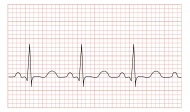Tachycardia facts for kids
|
An ECG showing a fast heart rate of about 100 beats per minute.
|
|
| ICD-10 | I47.-I49., R00.0 |
|---|---|
| ICD-9 | 427, 785.0 |
| MeSH | D013610 |
Tachycardia (say: tak-ih-KAR-dee-uh) is when your heart beats much faster than it should. For grown-ups, this usually means their heart rate is over 100 beats per minute. A fast heart rate can sometimes be a normal reaction, like when you're feeling stressed or exercising. However, depending on why it's happening and how healthy someone is, tachycardia can be serious and might need a doctor's help.
What is Tachycardia?
Your heart is a powerful muscle that pumps blood all around your body. It usually beats at a steady pace. When you have tachycardia, your heart speeds up. Think of it like a car engine running too fast.
How a Fast Heartbeat Can Be Harmful
A heart beating too quickly can cause problems in a couple of ways:
- Working too hard: When your heart beats very fast, it might not pump blood as well as it should. It's like trying to fill a bucket with water too quickly – some water might spill out.
- Needing more fuel: Just like any muscle, your heart needs oxygen and nutrients to work. When it beats faster, it needs even more of these. If the heart doesn't get enough, it can become tired or damaged. This is especially true for people who have ischaemic heart disease, which means their heart isn't getting enough blood flow.
When to See a Doctor
If your heart often feels like it's racing, or if you feel dizzy, lightheaded, or have chest pain when your heart beats fast, it's important to tell a trusted adult or see a doctor. They can figure out what's causing it and if you need any treatment.
See also
 In Spanish: Taquicardia para niños
In Spanish: Taquicardia para niños
 | Selma Burke |
 | Pauline Powell Burns |
 | Frederick J. Brown |
 | Robert Blackburn |


